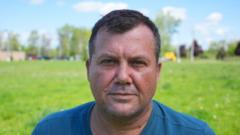**Charl Kleinhaus, a former South African farmer, recounts his transition to the United States, addressing the fears and accusations he faces after fleeing alleged persecution.**
**From Farm to Refuge: An Afrikaner's Journey to the US**

**From Farm to Refuge: An Afrikaner's Journey to the US**
**Charl Kleinhaus shares his struggles and experiences as a recently resettled refugee amid controversial immigration policies.**
Charl Kleinhaus, a 46-year-old former farmer from Mpumalanga province, South Africa, recently moved to the United States under a program initiated by former President Donald Trump, designed to provide refuge for white South Africans claiming persecution. Kleinhaus now resides in a budget hotel near a busy American highway, a stark contrast to his former life on a picturesque family farm filled with wildlife.
Kleinhaus explains that his decision to leave South Africa stemmed from receiving death threats via WhatsApp messages. "I didn't come here for fun," he insists, emphasizing the seriousness of his situation. He revealed that he had to abandon his home, car, and beloved pets, including his mother. However, he finds solace in the fact that his children are now safe.
The issue of white farmers in South Africa has gained significant traction within American political circles, especially on the right. Former President Trump and billionaire Elon Musk have been vocal advocates, alleging a "genocide" against white farmers—a statement that has drawn criticism and has been discredited by various experts. In February, Trump signed an executive order fast-tracking refugee status for individuals like Kleinhaus, who claim persecution based on their race.
The resettlement of Afrikaners has sparked controversy, drawing mixed reactions from both potential refugees and the South African government. President Cyril Ramaphosa labeled these emigrants "cowards," asserting that they are abandoning their responsibilities to confront apartheid's legacy. Kleinhaus acknowledges the struggles faced by black South Africans but firmly believes his experiences warrant refugee status.
Echoing sentiments that have divided the community, some fellow Afrikaners label Kleinhaus as an opportunist, suggesting that being a victim of crime does not equate to facing systemic persecution. While Kleinhaus admits that the murder rate among farmers is low, he insists that he has personally faced threats and violence in his community, stating, "There are people in my area who were shot and killed." He recalls receiving disturbing messages warning his family of impending danger.
Despite being assured of his refugee status, Kleinhaus voices concern over the possibility of being used as a political pawn by Trump. "It's scary," he states, contemplating the potential sweeping changes that could occur with new administration policies. "I believe it’s God's plan for me to be here," he adds, demonstrating unwavering faith amidst uncertainty.
Amid the controversy surrounding his immigration, Kleinhaus has come under scrutiny for past antisemitic social media posts, which he has since deleted. He attributes these remarks to a moment of fury rather than an overarching sentiment, although he acknowledges they misrepresented his views.
As questions regarding the vetting process for incoming refugees persist, the Department of Homeland Security has stated it follows strict screening procedures for all applicants. With skepticism surrounding his abrupt arrival in the U.S. amidst strict immigration policies for others, Kleinhaus maintains that his intent is to contribute positively to society. "People must not think we are just taking advantage of this," he asserts. He remains hopeful, believing that his resettlement in America is a part of a greater plan for his life.




















